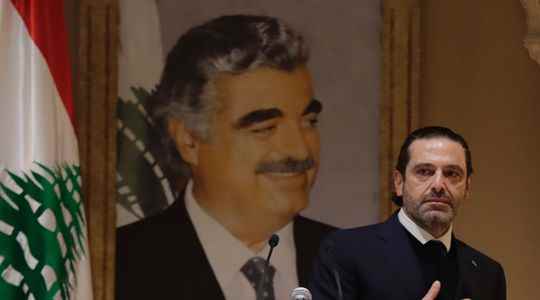Between the castle of the Sea and the alleys of the old souk of Saïda, about fifty kilometers south of Beirut, we can barely guess the features of Saad Hariri on a poster in faded colors hanging from a lamppost. “We are all with you”, can we read there. In the stronghold of the Sunni leader, birthplace of his father, former Prime Minister Rafic Hariri assassinated in 2005, the news that fell the day before is on everyone’s lips. On Monday, the leader of the Courant du futur, who was twice at the head of the government – his last term ended in January 2020 – announced his retirement from political life. He will not participate, and neither will his party, in the legislative elections, which are to be held on May 15, the first ballot since the popular revolt of October 2019 which demanded the departure of the entire ruling class.
For more than three decades, the Hariri family has dominated the Sunni scene and played a prominent role in Lebanese politics, which is based on power sharing between communities. Without it, the whole political landscape is now turned upside down, especially since no one seems able to fill the void thus left. Not even the eldest of the siblings, Bahaa, dismissed at the time of his father’s succession, and who is now trying to take revenge by setting up his own party.
“Who will defend us?”
In Saïda, through the speeches of several supporters, a whole range of feelings emerges. That of an abandonment first. “The Sunni community is truly an orphan. Who will represent us now?” asks Mohammad, a 38-year-old graphic designer. On the market, some say they miss the father, “charismatic” and who “knew how to bang his fist on the table when necessary”, “unlike the son” who is considered “weak”. “Hezbollah [parti chiite financé par l’Iran] can take our quarters in less than an hour! Who is going to defend us?” enrages Marouane, convinced that he will not vote. Hostility towards the Shiite formation is more and more significant within the other communities, who denounce its stranglehold on Lebanese institutions.
In 2014, Saad Hariri had chosen the modus vivendi with Hezbollah in order to preserve civil peace, at a time when tensions between Sunnis and Shiites were at their highest throughout the region. It is this choice that forces him today to withdraw from the game. The context has changed and the atmosphere is no longer in moderation. The Gulf countries, Saudi Arabia in the lead, have drawn a line under their ex-protégé and have, in all likelihood, largely “encouraged” him to step aside. The former Prime Minister cannot embody, in their eyes, the time of the confrontation with Hezbollah.
The son does not have the same assets as his father
In making his announcement, Saad Hariri could not hold back his tears, evoking the fight carried out by his father, who had given himself the mission of putting a country on its knees back on track at the end of fifteen years of civil war. The assassination of this man, from whom he never really managed to come out of the shadows due to his overly tender and indolent character, but also to the most delicate circumstances, sounded the death knell for Syrian guardianship over the Lebanon – after the popular demonstrations demanding the withdrawal of troops from Damascus -, but also the beginning of the rise in power of Hezbollah in the institutions. Saad Hariri successively attempted a frontal approach then a more accommodating one with Hassan Nasrallah’s party, each time at his expense.
Rafic Hariri, great friend of Jacques Chirac, had the qualities of his faults. That of a self-made-man who made his fortune in Saudi Arabia and who succeeded in everything. The crisis that Lebanon is going through today bears its mark in part, with an unsustainable economic model that combines massive indebtedness, exacerbated clientelism and excessive dependence on a hypertrophied banking sector. But Rafic Hariri had enough political weight, even beyond the Lebanese borders, for all of this to be almost secondary. His son has the same flaws, without having the same assets. The inheritance was too heavy. Over-ambitious dynastic pretensions.
